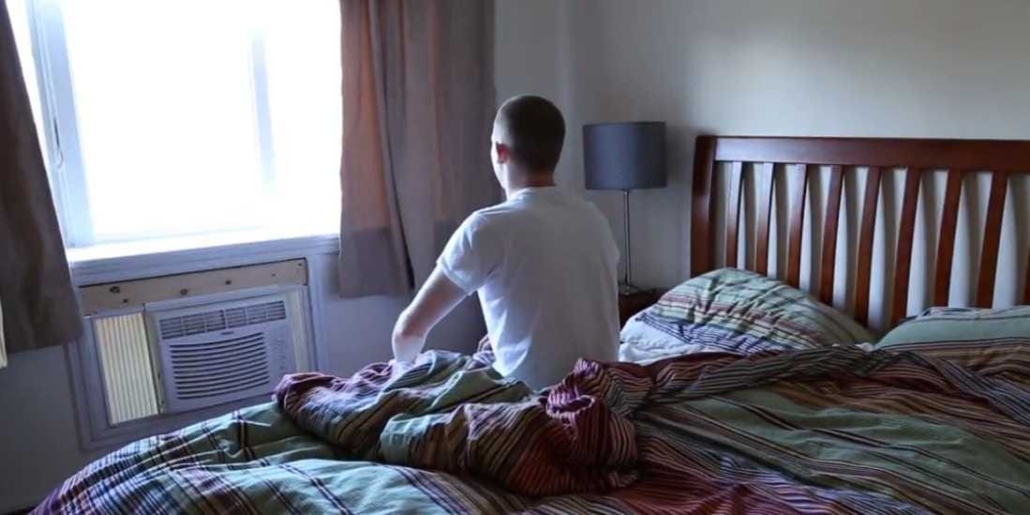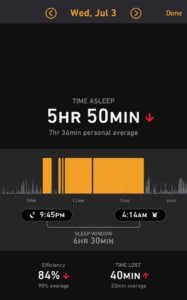
In this guest post, Paul Marlow, a leading advocate in Mental Health, shares how sleep can positively impact performance and gives pragmatic approaches to mental health that employers can take for their workforce.
Contents
- How Can Mental Struggles Affect Daily Work
- The Cornerstone To Addressing Mental Health Symptoms
- How Focusing On Getting 8 Hours of Sleep Helped Me
- Achieving An 8 Hour Restful Sleep
- How Did The ReadiBand Help Me So Much?
- What Can Companies Do To Help?
I remember stories that my father told me of his co-workers getting only the day off to go to their mother’s funeral, then head back to work the next day and do double-time to catch up for what they missed.
The inability to physically see the turmoil and devastation of mental illness going on in one’s head, allowed for the workforce to set the standard that mental struggles did not hold a flame to physical sickness or injury.
As the years have passed, so has the ability of society to speak up on such issues. Now in 2020, the world is recognizing that we all have mental health struggles at some point in our lives, and they can affect us far longer than it would take to heal a broken arm or get over the flu.
“In any given year, 1 in 5 people in Canada will personally experience a mental health problem or illness” – Canadian Mental Health Associaton
How Can Mental Struggles Affect Daily Work
Being down mentally will look different to everyone and will come in many forms. However, most people rarely see a professional to find out precisely what is making them feel “off.” Here are five common mental health issues that may be affecting someone in the workplace.
- Depression
- Generalized Anxiety Disorder
- Panic Disorder
- Obsessive-Compulsive disorder
- Post Traumatic- Stress disorder
Having any of these will leave you living in a world of uncertainty on how you will be able to attack today’s work and life problems.
Confidence level drops as one realizes that their brain is not working the same as it used to. It will drop even lower as the usual ways of ‘fixing’ oneself does not work anymore.
Self-doubt arises as one looks ahead and recognizes that some areas of their mental wellbeing are not currently affected, but they realize that is only a matter of time until their mental struggles spread.
Fear of failure becomes a constant precursor to any new venture.
“How can I complete next week’s work when I barely finished this week? Not to mention how poor the quality was because I am barely keeping my head above water.”
The Cornerstone To Addressing Mental Health Symptoms
Now, there is no magic pill to fix every mental health illness, and we are still finding out ways to address the ones we can detect, but one thing has become apparent in the fight against these unforeseen illnesses.
Getting Proper Sleep Is The Backbone To Getting Better
“Sleep deprivation affects your psychological state and mental health.” – Harvard Health Publishing
How Focusing On Getting 8 Hours of Sleep Helped Me
Within a three-year window, I was diagnosed with PTSD from a rocky relationship and then watching my father waste away from Parkinson’s Disease. Topping it all off, he suddenly passed from a bought of cancer, and that was my last straw. The mental state those events left me in had me missing four weeks of work straight plus an additional 30 days combined of “I can’t make it out of my bed today.”
Putting together positive daily actions was my first step in fighting back:
- Creating a 60-minute morning routine
- Journaling – How to journal guide
- Meditating
- Exercising – 9 Mental Health Benefits of Exercising
- Eating clean foods
Yet the action of finding my way back to a restful nights’ sleep gave me the most significant positive impact on my mental health.
Achieving An 8 Hour Restful Sleep
Your sleep will occur in the evening; however, the first step to getting the most out of your nights’ slumber needs to happen during the day.
Lifestyle Changes
At some point, certain things we have done all of our lives need to be re-assessed. Can your body digest and use efficiently the processed foods you eat each meal. Are the three scoops of sugar in your coffee helping or hindering you?
Do the after-dinner glasses of alcohol help your poor sleep?
” Alcohol often does reduce sleep onset latency—the time it takes to fall asleep. Depending on how much alcohol is consumed, however, what seems like falling asleep might be something closer to passing out. And we quickly build a tolerance for the sedative effects of alcohol, which means you may need to drink more to have the same initial sleep-inducing effects. ” The Truth About Alcohol and Sleep
Exercising
Take part in a class, join a recreational sports league, hop on a bicycle and get a few Kms under your belt or go to the gym and throw around some weights.
Whatever you do, put your phone down, plug in your headphones and attack your workout with a tenacity that will drown out any sorrows for 60 minutes. Working out will also help give your body a higher chance of achieving a deeper, more restful sleep.
Relaxation Techniques
Adding useful tools to your evenings that can help your self analyzation of your mental state and also clear your head of any unwanted distractions from the day. Meditating, in any form, will develop a positive long term change in your sleep patterns. Download an app and get help with guided meditations, or turn all the lights down and music off and find a comfortable corner of your room. Doing merely 10 minutes a day will have a lasting effect.
Additionally, pulling out a pen and paper to allow your thoughts flow. The act of physical writing allows for stronger critical thinking and allows for more effective memory recall. Those written thoughts will come back to you to help daily situations that you don’t desire to repeat any more — allowing you to change that adverse action into a positive.
Understanding Your Sleep
When I was depressed, I thought 6.5 hours of sleep I assumed I was getting was a good night’s sleep. Boy, was I wrong!

Screen Shot of Sleep From July 3rd
That is a screenshot from the first week of wearing Readi by Fatigue Science. I was amazed by how wrong I was in my understanding of how my actual sleep looked.
You will see below the 5HR 50MIN a reading of “7Hr 36Min personal average”. That is what my current sleep average is.
I have gained just shy of 2 hours extra sleep a night since using the ReadiBand in only seven months.
The thing is, I changed nothing else in my daily life. I was still following the same daily routines that were showing positive effects in my mental health, but being able to understand and address my sleep needs pushed it all over the top.
How Did Readi Help Me So Much?
Seeing Physical Scientific Proof
We can guess all we want, but once you see factual information on a simple interface, it allows you to address your sleep troubles with a new and focused mindset.
Analyze New Routines Effectiveness
Now you have a standard of sleep analytics to base your next move on. Perhaps you hear that eating nothing after 7 PM can positively affect your sleep. You can put that into effect for a week and see how it influences your sleep.
Positive Reinforcement
Just like any other interaction in life, we humans get positive feedback when we can visually see a positive change in an action that we are working to better. Sleep is no different.
Having the ability to see over a 30 day period that you are going to bed an hour earlier, wakening only two times a night compared to your original six. Topping it off with an average of thirty-four extra minutes of sleep a night is a winning combination that anyone would feel rewarded in trying to continue to improve.
What Can Companies Do To Help?
The first step that can help your workers is to let them know that you understand mental health is an area you believe in, and they do not need to feel afraid of talking about their struggles.
5 Things Companies Can Do To Promote Positive Mental Health
- Input additional mental health days off, alongside sick days
- Add Mental Health Benefits for your employees ( Check Out Starbucks $5000 initiative )
- Give a paid hour for working out
- Add a meditation app to the benefits package
- Add a sleep app to the benefits package
If your workforce is running on all cylinders, the work output will drive sales and growth, month after month.
The minimal investment in each employee to make sure they have the right tools to help themselves get better sleep will put back into the company tenfold.
About the Author

Paul Marlow is a leading advocate in Mental Health. Along with writing blogs to help inform and inspire those in need, he regularly talks at conferences. His company Never Alone was started during his mental health struggles after his father passed. Never Alone is a cumulation of daily motivation, free help for those in need and the Never Alone clothing line. Never Alone’s goal is to break the stigma around mental health one day at a time.
Twitter
Instagram
LinkedIn
Facebook
Website
Interested in learning more about data-driven fatigue management?
or download our free eBook on the Science of Sleep for industrial workforces